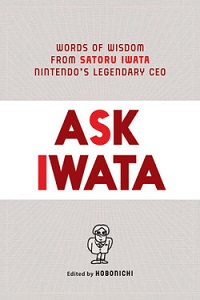
Ask Iwata, edited by Hobonichi, Viz Media, May 27th, 2021
Satoru Iwata was the CEO of Nintendo from 2002 until his unexpected death from cancer in 2015. He was only 55 when he died which is very young for the long-living Japanese and a surprise for many people around the world who had become quite fond of him. In noticing his relative youth in death, it is hard to not to also notice his amazing rise to CEO of one of the most recognisable companies in the world when in his early forties. At the time of his death, Iwata had become more than a CEO as he had fostered a close an endearing public persona with his customers and was also well-liked in the industry. The quote from him on the back cover of this book well illustrates this:
“On my business card, I am a corporate president. In my mind, I am a game developer. But in my heart, I am a gamer.”
I would generally be inclined to dismiss such comments as empty corporate rhetoric but in Iwata’s case, I’d consider it genuine. He was one of the few corporate executives that I could think of that really worked his way from the bottom to the top. The book gives some biographical snippets of his early life which covers some of this. He started out as a programmer for HAL Laboratory which has worked closely with Nintendo for a long time. He became head of the company when it was deeply in debt and was able to turn it around, a feat which probably impressed the then head of Nintendo, Hiroshi Yamauchi and led to his eventual rise to the head of Nintendo.
The main takeaway from all this though is he was a programmer who developed games. He not only had direct experience with making the product, he was also very good at it. His game credits are very impressive and continue through the late 1990s while he was working at an executive level. In short, he wasn’t the kind of CEO you generally associate with corporations. Even Japanese corporations — which still have their share of empty suits.
To get to the contents of the book itself, it is an edited series of extracts from the “Iwata Asks” segments on the Nintendo website and discussions with Shigesato Itoi from his website, Hobo Nikka Itoi Shimbun. The latter makes for the majority of the content. It also has contributions from Shigeru Miyamoto and the aforementioned Itoi. The former is well-known as the creator of Nintendo’s best known games including Donkey Kong, Super Mario Bros. and The Legend of Zelda. The latter is better known in his homeland as a writer but known to Western audiences as the creative force behind the Mother series of RPGs. Earthbound for the Super Nintendo was the second in the series and the third has still not been localised as of writing.
I imagine the impetus to translate this book was born more of the popularity of its subject than the contents. This is not really a book about video games or Satoru Iwata. At its core, it is firmly in the business genre and most of Iwata’s statements are business focused. It is also a very short book, in large font and broken into very short sections that can be read during travel of trains and planes. In fact, if one was on a long enough flight, it could easily be finished in a sitting. The short sections are further bookmarked by “Words of Wisdom” which are shorter quotes from Iwata, also with a business focus. None of this is a criticism, it is just warning readers expecting a biography to curb their expectations before going through the checkout.
Iwata had a unique managerial style that involved direct meetings and discussion with employees on a regular basis. If this book is to be believed, he was not one to lose his temper and was very patient and understanding with his employees. Much of the book covers his success in overcoming problems such as development on Earthbound, the launch of the Wii and the debt troubles of HAL Laboratories. All of which turned out to be successful in the end.
The business talent of a man with a programming background might seem unusual but it is not uncommon for even the lowliest white collar workers in Japan to be business orientated. The company you join in your youth is often the one you retire with and given the close relationship between HAL Laboratories and Nintendo, Iwata wasn’t exactly an exception to this rule. There are exceptions but they aren’t nearly as common as in the West. So it isn’t so unexceptional for someone like Iwata though he started on the technical side, to have a strong sense of the business side of the company.
For someone working in the industry and wanting to get a peak at some of the “magic” that has kept Nintendo so enduringly popular, this will be appealing. For anyone expecting a lot of talk about video games, they will no doubt be quite disappointed. I did not go in with the wrong expectations but it would be very easy for some readers to do given how well known Iwata became. In fact, I’m expecting the Western publisher is banking on the name selling a lot more copies than the content.
The book then, is a brief but fascinating window into the business philosophy of the man behind much of Nintendo’s recent success and the methods he employed to get the company there. The additional reflections of Itoi and Miyamoto give more insight into the man himself but much of the content is firmly focused on overcoming difficulties and running a successful company.
